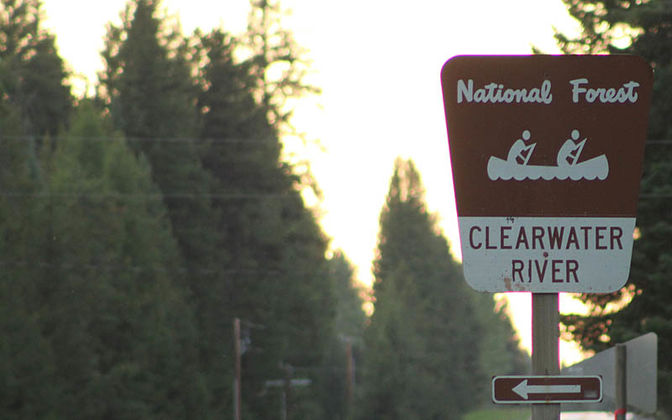Judge Temporarily Halts Gravel Pit Near Seeley Lake
The nonprofit Protect the Clearwater is suing the Montana Department of Environmental Quality after the state gave LHC, Inc., a permit to build a gravel pit near Elbow Lake
By Justin Franz, Montana Free Press
A Missoula County judge has temporarily halted the construction of a gravel pit in the Seeley Swan Valley after a recently formed nonprofit alleged that the state had not conducted a thorough enough environmental review of the project.
Earlier this year, the Montana Department of Environmental Quality approved a “Dry Land Opencut Mining Permit” to LHC, Inc., of Kalispell, to establish a 21.2-acre gravel pit on State School Trust Lands about three miles north of Clearwater Junction, near Elbow Lake. The pit was to supply gravel and asphalt for an ongoing Montana Department of Transportation road project on Montana Highway 83. But as work on the site was set to begin, nearby residents became concerned about the impact the pit would have, particularly to Elbow Lake and the Clearwater River. They were also concerned about noise and dust coming from the site.
The residents formed a nonprofit called Protect the Clearwater to fight the project, and on May 27 filed a formal administrative appeal with the state Board of Environmental Review, followed by a lawsuit against DEQ in Missoula County District Court. The group also filed a request for a temporary restraining order and preliminary injunction. On July 17, Missoula County District Court Judge John W. Larson granted a temporary restraining order and set a hearing to determine whether or not he would allow the order to continue until the administrative appeal is complete. During that July 21 hearing, the judge asked both sides of the case to file briefs by the end of last week before he would make a final decision.
A key complaint of Protect the Clearwater is that the state issued LHC a dryland mining permit instead of a standard mining permit. During the 2021 legislative session, a law was passed to streamline the permitting of gravel pits that are “high and dry” (meaning pits that don’t have an impact on ground or surface water) and are isolated from populated areas, defined as fewer than 10 occupied dwellings within a half-mile of the site. But Protect the Clearwater believes the state should have applied more scrutiny to the project, and that the public should have had more time to comment on it. LHC applied for the permit in March and received it about a month later.
In an affidavit, David Allen Donohue, a senior hydrologist with Helena-based HydroSolutions, Inc., wrote that he believed the issuance of a permit was “premature” because, in his opinion, LHC had not provided sufficient information to the state about how ground and surface water in the area would be impacted by gravel pit operations. Affidavits have also been filed by area residents, including Gayla Nicholson, who purchased a cabin near the site back in 2019. She raised concerns about the impact to water, wildlife and her own quality of life.
“I and my family, local wildlife, and possibly, the Clearwater River and Watershed will experience short-term and long-term negative effects from the Clearwater-State Opencut Gravel Mine,” she wrote. “We will no longer be able to peacefully enjoy our property, our property value will decrease, previous investments by the state will be wasted, wildlife will be at risk, and our right to participate in this decision has been ignored.”
In court documents, LHC attorneys and employees said the company stands to lose more than $1 million if the gravel pit remains closed and has to be moved. In its brief opposing the temporary restraining order, LHC attorneys wrote that the company’s permit application was completed “by the book and to the letter.” They state that the pit is far above the average static water level of any groundwater wells in the area and that the closest well is 1,000 feet away. It also states that the pit is a quarter mile-away from the river and lake. The company also states that it has worked hard to screen the gravel pit from view and keep the amount of dust it produces to a minimum.
The company contends that if it is forced to shut down the gravel pit, it will have to truck materials from an established pit farther away in Ovando, thus consuming more fuel on each trip.
This story originally appeared in the Montana Free Press, which can be found online at montanafreepress.org.